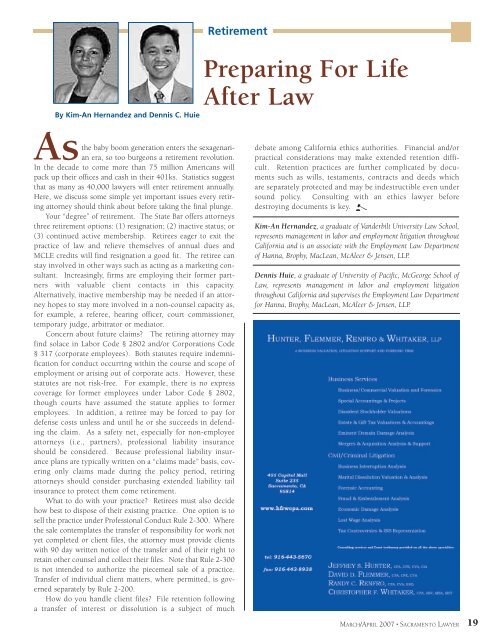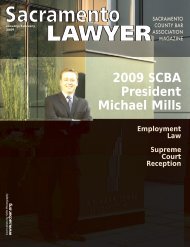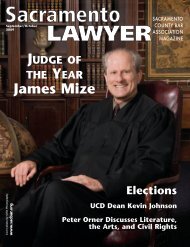March / April 2007 - Sacramento County Bar Association
March / April 2007 - Sacramento County Bar Association
March / April 2007 - Sacramento County Bar Association
You also want an ePaper? Increase the reach of your titles
YUMPU automatically turns print PDFs into web optimized ePapers that Google loves.
Retirement<br />
Preparing For Life<br />
After Law<br />
By Kim-An Hernandez and Dennis C. Huie<br />
Asthe<br />
baby boom generation enters the sexagenarian<br />
era, so too burgeons a retirement revolution.<br />
In the decade to come more than 75 million Americans will<br />
pack up their offices and cash in their 401ks. Statistics suggest<br />
that as many as 40,000 lawyers will enter retirement annually.<br />
Here, we discuss some simple yet important issues every retiring<br />
attorney should think about before taking the final plunge.<br />
Your “degree” of retirement. The State <strong>Bar</strong> offers attorneys<br />
three retirement options: (1) resignation; (2) inactive status; or<br />
(3) continued active membership. Retirees eager to exit the<br />
practice of law and relieve themselves of annual dues and<br />
MCLE credits will find resignation a good fit. The retiree can<br />
stay involved in other ways such as acting as a marketing consultant.<br />
Increasingly, firms are employing their former partners<br />
with valuable client contacts in this capacity.<br />
Alternatively, inactive membership may be needed if an attorney<br />
hopes to stay more involved in a non-counsel capacity as,<br />
for example, a referee, hearing officer, court commissioner,<br />
temporary judge, arbitrator or mediator.<br />
Concern about future claims? The retiring attorney may<br />
find solace in Labor Code § 2802 and/or Corporations Code<br />
§ 317 (corporate employees). Both statutes require indemnification<br />
for conduct occurring within the course and scope of<br />
employment or arising out of corporate acts. However, these<br />
statutes are not risk-free. For example, there is no express<br />
coverage for former employees under Labor Code § 2802,<br />
though courts have assumed the statute applies to former<br />
employees. In addition, a retiree may be forced to pay for<br />
defense costs unless and until he or she succeeds in defending<br />
the claim. As a safety net, especially for non-employee<br />
attorneys (i.e., partners), professional liability insurance<br />
should be considered. Because professional liability insurance<br />
plans are typically written on a “claims made” basis, covering<br />
only claims made during the policy period, retiring<br />
attorneys should consider purchasing extended liability tail<br />
insurance to protect them come retirement.<br />
What to do with your practice? Retirees must also decide<br />
how best to dispose of their existing practice. One option is to<br />
sell the practice under Professional Conduct Rule 2-300. Where<br />
the sale contemplates the transfer of responsibility for work not<br />
yet completed or client files, the attorney must provide clients<br />
with 90 day written notice of the transfer and of their right to<br />
retain other counsel and collect their files. Note that Rule 2-300<br />
is not intended to authorize the piecemeal sale of a practice.<br />
Transfer of individual client matters, where permitted, is governed<br />
separately by Rule 2-200.<br />
How do you handle client files? File retention following<br />
a transfer of interest or dissolution is a subject of much<br />
debate among California ethics authorities. Financial and/or<br />
practical considerations may make extended retention difficult.<br />
Retention practices are further complicated by documents<br />
such as wills, testaments, contracts and deeds which<br />
are separately protected and may be indestructible even under<br />
sound policy. Consulting with an ethics lawyer before<br />
destroying documents is key.<br />
Kim-An Hernandez, a graduate of Vanderbilt University Law School,<br />
represents management in labor and employment litigation throughout<br />
California and is an associate with the Employment Law Department<br />
of Hanna, Brophy, MacLean, McAleer & Jensen, LLP.<br />
Dennis Huie, a graduate of University of Pacific, McGeorge School of<br />
Law, represents management in labor and employment litigation<br />
throughout California and supervises the Employment Law Department<br />
for Hanna, Brophy, MacLean, McAleer & Jensen, LLP.<br />
■ MARCH/APRIL <strong>2007</strong> SACRAMENTO LAWYER<br />
19






